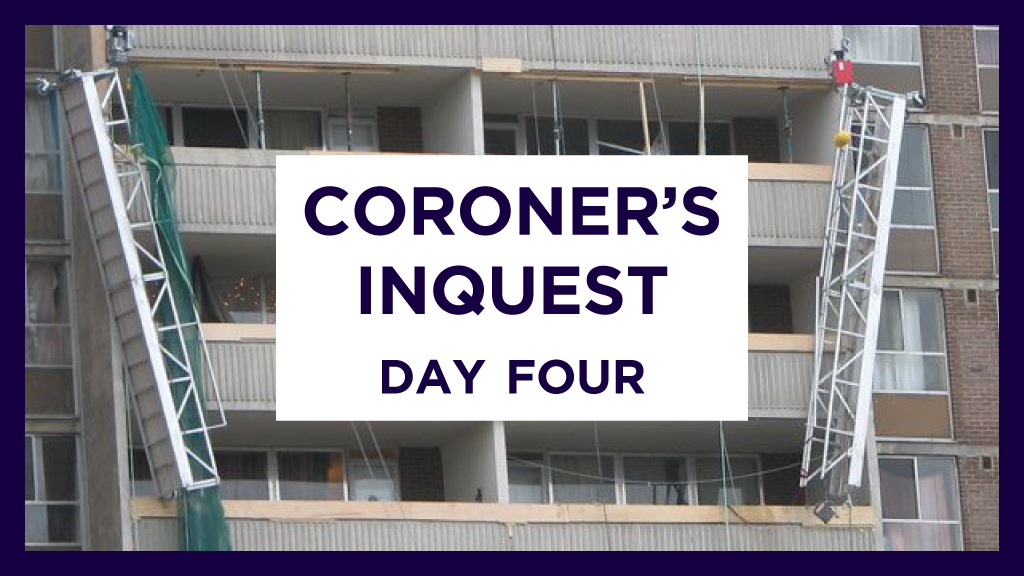Four contrasting visions of how Ontario’s construction jobsites should be regulated to make them safer places to work were aired on day four of a coroner’s inquest into the deadly swing stage incident of December 2009.
By the end of Thursday (Feb. 3), the five-person jury had received a charge from inquest officer Dr. John Carlisle and suspended deliberations overnight.
On Christmas Eve 12 years ago, Metron Construction employees Fayzullo Fazilov, Aleksey Blumberg, Vladimir Korostin and Alexander Bondorev plunged 13 storeys to their deaths at a Toronto highrise jobsite when the suspended swing stage platform they were riding on collapsed. The mandatory inquest is being held 12 years after the fatal incident because other legal processes such as the criminal and occupational health charges must by law be exhausted.
A statement of facts pointed to substandard construction of the swing stage and failure to use fall arrest gear as causes of the incident.
After three days of testimony, inquest participants were asked to propose a verdict and recommend systemic improvements for the jury to consider to prevent similar deaths in the future.
Verdict and recommendations expected today
Lawyer Craig Flood, counsel for the Ontario Building Trades, supported five recommendations agreed upon by several proponents and introduced nine more.
“It’s our submission that based on the evidence, even more needs to be done to address what I would call the ongoing carnage of fatalities and critical injuries from falls from heights on construction projects,” said Flood.
The core five recommendations were supported by Metron, represented by lawyer Jordan Assaraf, the Building Trades and the inquest counsel team represented by officer Jai Dhar.
The first recommendation called on the Ministry of Labour, Training and Skills Development (MOL) to amend provincial construction regulations to include a mandatory requirement for training of health and safety representatives who work on construction projects. Another urged an amendment to the notification requirements of the construction regulations regarding work platforms, while a third called on the Chief Prevention Officer to continue to monitor the effectiveness of working at heights training.
For lawyer Neil Gobardhan, counsel for the MOL, the five joint recommendations, and also the nine others proposed by the Building Trades, represented overreach and were unnecessary given the extensive reforms introduced by the government over the last decade.
MOL emphasizes scope of inquest
“I would suggest to you, you would have to have three criteria in order to make any recommendation,” said Gobardhan. “The most important is it would have to be in scope. The second is it would have to be practical. And the third is it would have to have a measurable positive impact.”
Addressing each recommendation, the MOL counsel repeatedly said they did not flow from the facts of the case, such as a recommendation related to training when there had been no evidence introduced that the training of the four deceased workers was deficient, or were otherwise irrelevant or burdensome.
“The scope is extremely important,” said Gobardhan. “As much as general improvements to health and safety are laudable goals, it’s outside of the scope of this inquest, unfortunately, and the rationale for that is, without limiting the scope on these inquests, the inquest would become unworkable.”
Dhar also commented on the issue of scope, saying, “You should be satisfied that it could prevent similar deaths in the future.”
He noted the jurors had listened to two proponents, the Building Trades and the MOL, pulling in opposite directions, “and I’m going to submit to you that as with most things in life, the answer is somewhere in the middle.”
What training did the incident crew have?
Assaraf, representing Metron, noted that Metron project manager Vadim Kazenelson had taken the required training – a three-day course on suspended access equipment followed by a one-day instructor’s course.
“We unfortunately will never know why the deceased men, who were experienced and trained, decided to get on a fateful swing stage without fall protection,” he said.
Kazenelson was charged with four counts of criminal negligence causing death and one count of causing bodily harm, found guilty and sentenced to serve three-and-a-half years in jail.
Metron owner Joel Swartz and the company itself were handed large fines.
“This tragic incident brought the biggest changes in the construction industry,” said Assaraf in arguing to limit recommendations. “There is only so much that one can do to prevent accidents from happening. In the end, each person chooses how they wish to act.”
The jurors were told they could adopt any of the recommendations suggested by the inquest parties and they could propose their own. After their deliberations, the jurors are to meet with the coroner’s team to review their proposals.
Follow the author on Twitter @DonWall_DCN.











Recent Comments
comments for this post are closed